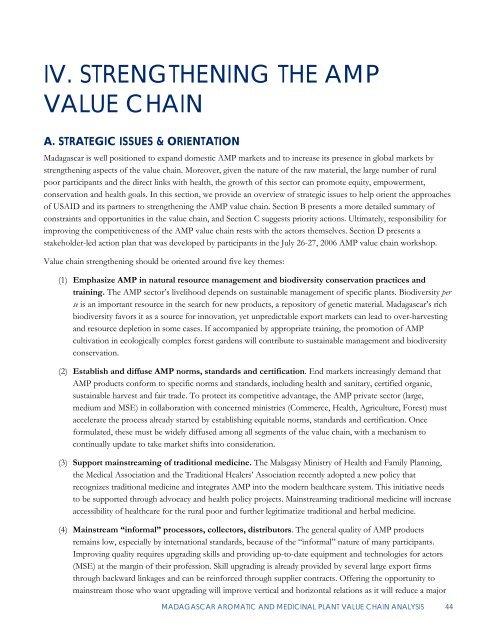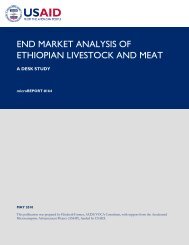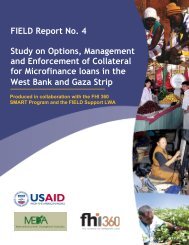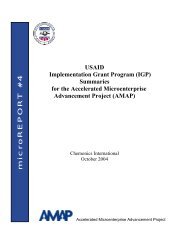Madagascar Aromatic and Medicinal Plants Value - Microlinks
Madagascar Aromatic and Medicinal Plants Value - Microlinks
Madagascar Aromatic and Medicinal Plants Value - Microlinks
Create successful ePaper yourself
Turn your PDF publications into a flip-book with our unique Google optimized e-Paper software.
IV. STRENGTHENING THE AMP<br />
VALUE CHAIN<br />
A. STRATEGIC ISSUES & ORIENTATION<br />
<strong>Madagascar</strong> is well positioned to exp<strong>and</strong> domestic AMP markets <strong>and</strong> to increase its presence in global markets by<br />
strengthening aspects of the value chain. Moreover, given the nature of the raw material, the large number of rural<br />
poor participants <strong>and</strong> the direct links with health, the growth of this sector can promote equity, empowerment,<br />
conservation <strong>and</strong> health goals. In this section, we provide an overview of strategic issues to help orient the approaches<br />
of USAID <strong>and</strong> its partners to strengthening the AMP value chain. Section B presents a more detailed summary of<br />
constraints <strong>and</strong> opportunities in the value chain, <strong>and</strong> Section C suggests priority actions. Ultimately, responsibility for<br />
improving the competitiveness of the AMP value chain rests with the actors themselves. Section D presents a<br />
stakeholder-led action plan that was developed by participants in the July 26-27, 2006 AMP value chain workshop.<br />
<strong>Value</strong> chain strengthening should be oriented around five key themes:<br />
(1) Emphasize AMP in natural resource management <strong>and</strong> biodiversity conservation practices <strong>and</strong><br />
training. The AMP sector’s livelihood depends on sustainable management of specific plants. Biodiversity per<br />
se is an important resource in the search for new products, a repository of genetic material. <strong>Madagascar</strong>’s rich<br />
biodiversity favors it as a source for innovation, yet unpredictable export markets can lead to over-harvesting<br />
<strong>and</strong> resource depletion in some cases. If accompanied by appropriate training, the promotion of AMP<br />
cultivation in ecologically complex forest gardens will contribute to sustainable management <strong>and</strong> biodiversity<br />
conservation.<br />
(2) Establish <strong>and</strong> diffuse AMP norms, st<strong>and</strong>ards <strong>and</strong> certification. End markets increasingly dem<strong>and</strong> that<br />
AMP products conform to specific norms <strong>and</strong> st<strong>and</strong>ards, including health <strong>and</strong> sanitary, certified organic,<br />
sustainable harvest <strong>and</strong> fair trade. To protect its competitive advantage, the AMP private sector (large,<br />
medium <strong>and</strong> MSE) in collaboration with concerned ministries (Commerce, Health, Agriculture, Forest) must<br />
accelerate the process already started by establishing equitable norms, st<strong>and</strong>ards <strong>and</strong> certification. Once<br />
formulated, these must be widely diffused among all segments of the value chain, with a mechanism to<br />
continually update to take market shifts into consideration.<br />
(3) Support mainstreaming of traditional medicine. The Malagasy Ministry of Health <strong>and</strong> Family Planning,<br />
the Medical Association <strong>and</strong> the Traditional Healers’ Association recently adopted a new policy that<br />
recognizes traditional medicine <strong>and</strong> integrates AMP into the modern healthcare system. This initiative needs<br />
to be supported through advocacy <strong>and</strong> health policy projects. Mainstreaming traditional medicine will increase<br />
accessibility of healthcare for the rural poor <strong>and</strong> further legitimatize traditional <strong>and</strong> herbal medicine.<br />
(4) Mainstream “informal” processors, collectors, distributors. The general quality of AMP products<br />
remains low, especially by international st<strong>and</strong>ards, because of the “informal” nature of many participants.<br />
Improving quality requires upgrading skills <strong>and</strong> providing up-to-date equipment <strong>and</strong> technologies for actors<br />
(MSE) at the margin of their profession. Skill upgrading is already provided by several large export firms<br />
through backward linkages <strong>and</strong> can be reinforced through supplier contracts. Offering the opportunity to<br />
mainstream those who want upgrading will improve vertical <strong>and</strong> horizontal relations as it will reduce a major<br />
MADAGASCAR AROMATIC AND MEDICINAL PLANT VALUE CHAIN ANALYSIS 44





